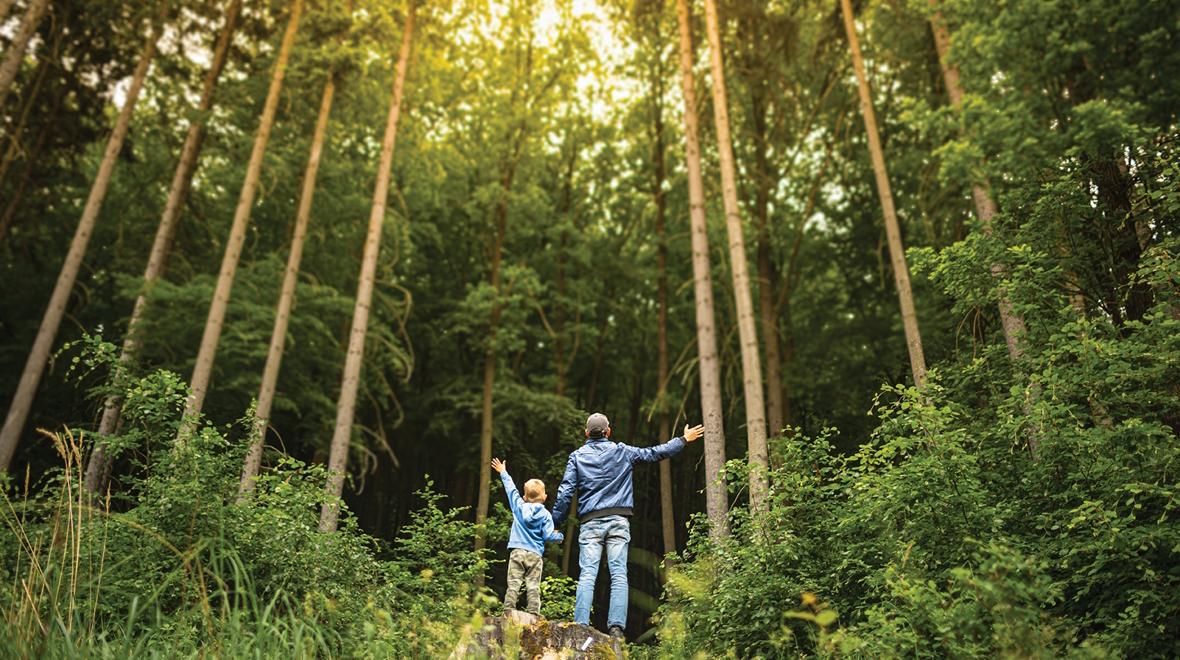
Photo:
iStock
When they are little, our kids think we know everything, and it’s easy to feel like we do. Whether we feel a need to maintain parental authority or just don’t want to disappoint their absolute trust in us, we often try to appear knowledgeable and in control at all times. But when we acknowledge the limits of our own experiences and model openness to new ones, we do ourselves and our children a big favor. And when we approach it with the right attitude, exploring the unknown together as a family can be more fun than scary.
“When you learn together, that’s so exciting! As adults we get very stagnant in our thought processes built on the experiences we’ve had. Children don’t have that because they’re still learning. They wonder and try new things. If we, as adults, will just sit back and wonder with them instead of always knowing, you will learn something new, too. Letting your child take the lead or learning alongside them, just being okay to sit in the unknown, will really create a new experience for you and your child,” says Jamie Bonnett, director of education at KidsQuest Children’s Museum.
Cultural horizons
We cannot raise anti-racist children without giving them broad exposure to other cultures and traditions. It requires parents to step outside of their own comfort zone, but it can also be fun.
Koloud Tarapolsi is a children’s book author and founder of A Crafty Arab, a business providing resources to develop a better understanding of Arab culture. Her latest offering is the Cook With … an Arab series in which interested adults and kids gather in a home kitchen in Bellevue on a Sunday morning to cook and eat a meal together. The instructors may be talented home cooks or well-known restaurateurs, longtime residents or new arrivals, but all of them are refugees from Arab countries. Past classes have featured the cuisine of Egypt, Morocco, Palestine, Syria and Iraq.

“The point is not just to give money to the refugees, but also to connect people in the community to them. It’s a really nice personal experience,” says Tarapolsi. Once you’ve had brunch with an Iraqi refugee, you’ll hear news stories about violence in Iraq with a new perspective.
The chefs share information about their culture and their own lives together with their recipes, and sometimes their families join the class for the finished meal. Tarapolsi says this kind of family experience is critical to Arab food culture.
“For me as a child, I remember sitting in the kitchen with all these women cooking, listening to them talk and laugh and gossip. That’s what I grew up on, cooking was a community thing. I hope that kids really see they are not taking part in just a cooking class, with somebody saying, ‘Take two teaspoons and put it in here.’ I hope the kids see this sense of community that I grew up with, with so much love. It’s called nafas — it’s the way that you put love into the food.”
Classes are open to men, women and children; participants have been as young as 11. Registration is through the A Crafty Arab Facebook page.
“As long as a child can participate and they feel comfortable doing what the adults are doing, then bring it on,” Tarapolsi says.
Experiences like Cooking With … an Arab help parents avoid cultural appropriation and create authentic connections by engaging directly with communities. Rather than a presentation that passively observes or worse, speaks for others, an authentic cultural experience actively involves and is ideally led by members of the community and culture of interest.
Arts horizons
Not all cultural horizons relate specifically to ethnicity. Even if you don’t know Mozart from MoPOP, giving the arts a try can have real results. Research has found connections between exposure to the arts and the development of social and emotional skills, and has shown that students who receive an arts education are better at setting and achieving ambitious goals, and are more likely to go to college. With a little planning, you can visit almost any museum in the Puget Sound area for free. Here on the left coast, attending fine arts performances does not require formal wear (unless dressing up is part of the fun for you). Seattle Opera and Seattle Symphony, as well as Pacific Northwest Ballet (PNB) all have information on their websites to help plan your first visit.
Seattle Opera has dedicated Family Day performances, with $20 seats for anyone ages 18 and younger. In June, families can buy tickets to see professional singers perform the same 45-minute youth opera that tours local schools, and every spring, the students of the Youth Opera Project produce their own all-ages opera. Seattle Symphony’s Family Connections program invites youths ages 8–18 to attend many Seattle Symphony concerts for free with the purchase of an adult ticket. Dance is one of the most immediately accessible forms of the fine arts, and “The Nutcracker” is a popular first ballet for families. But you don’t have to wait for the winter holidays; most dance-company seasons include at least one fairy tale ballet, and the annual PNB School performance features students at all levels. If the theater is new to you, Seattle Children’s Theatre offers an entire season of professional theater developed for young audiences, and ParentMap identifies family-friendly shows around the region several times a year.

Nature’s horizons
The Pacific Northwest is famous for its trail-mix-crunching denizens with their REI fashion sense, so it can be a little awkward admitting you’re a total city slicker. But even if the indoors is your natural habitat, it has been scientifically proven that people who spend time outdoors are happier, healthier, less stressed and suffer from fewer psychological problems than those who do not. Fortunately, we live in one of the world’s most beautiful places, and it’s not hard for even the most staunchly urban family to spend some time with Mother Nature. You might start by seeking out urban nature experiences, checking the ParentMap calendar for guided nature walks, or taking public transportation to hit one of the area’s most popular hiking trails. Ease into camping with glamping, yurts or a farm stay. After a couple of days offline, you might find yourself actually enjoying going a little feral.
Your child’s interests
Possibly the most rewarding way to expand your family’s horizons is to let your child take the lead. It’s easy to lean in when we share our child’s interests, so we don’t always realize the ways in which we discourage our kids when their interests differ from ours. But there is a huge payoff when bookish parents refrain from rolling their eyes at their daughter’s obsession with soccer, or when Mariners fans skip a game to attend their son’s ballet recital. So pay attention to those lengthy lectures on dinosaur anatomy or the biographical details of all seven members of BTS. Even if you never become part of the BTS Army or learn to appreciate the distinction between a triceratops and a torosaurus, you’ll gain some insight into your child’s world, and your respectful attention is a priceless gift to that child.
“Sometimes your child can become the teacher and you become the learner. That’s a really cool position to give that child. The sense of knowledge and empowerment that they are someone who can bring something to the table fosters their growth and development. And it makes you, as an adult, look at the world a little differently, and that’s pretty cool, too,” says Bonnett.











